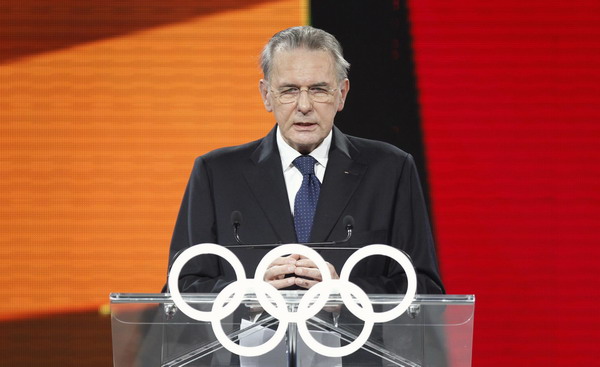IOC, USOC near agreement on revenue-sharing deal
Updated: 2012-05-23 11:25
(Agencies)
|
|||||||||||
QUEBEC CITY - International and US Olympic leaders are close to finalizing a deal to settle the long-running financial dispute that has soured relations and undermined recent American bids for the games, a senior official said Tuesday.
 |
|
International Olympic Committee President Jacques Rogge speaks during a luncheon at the Centre de Foires in Quebec City, May 22, 2012. [Photo/Agencies] |
The International Olympic Committee and US Olympic Committee are nearing agreement on a new revenue-sharing deal that would clear the way for US cities to bid again for future games, IOC executive board member Denis Oswald told The Associated Press.
The proposed deal, covering the distribution of billions of dollars in television and marketing revenues, could be announced this week during IOC executive board meetings in Quebec, Oswald said.
Oswald, who heads the association of summer Olympic sports, is not directly involved in the negotiations but said he was briefed on the progress by IOC President Jacques Rogge.
"I have been told by the IOC president that they were close to an agreement but that they still had to discuss the wording," the Swiss official said. "Last time they were also close to an agreement but they had difficulty to put it on paper.
"That's why he wasn't sure whether they would be able to finalize it, but he looked quite hopeful."
Negotiations have been dragging on for two years to secure a new deal that replaces a long-standing contract giving the USOC a 20 percent share of global sponsorship revenue and a 12.75 percent cut of US broadcast rights deals. The IOC believes the US share is excessive.
A new agreement, which would need to be ratified by the governing boards of both organizations, would take effect in 2020. Recent talks have centered on a 20-year deal through 2040 that would also include US contributions toward the administrative costs of staging the games.
"It's good if we have an agreement because this has created difficulties in the relations with USOC," Oswald said. "If we could put that aside, it would help the relations. It's a very important national Olympic committee with the best athletes. It would be very good if this question be resolved."
USOC CEO Scott Blackmun has been leading the American side in the talks with the IOC.
"We're endeavoring in good faith to bridge the gap," he told the AP last week. "I remain very hopeful that within the not too distant future we can put this behind us."
Blackmun and USOC chairman Larry Probst are traveling to Quebec this week.
Lingering international resentment over the US revenue share was a significant factor in New York's defeat in the bidding for the 2012 Olympics and Chicago's humiliating first-round elimination in the vote for the 2016 Games.
The USOC has said repeatedly it will not bid again until the revenue issue is resolved. The US is sitting out the bidding for the 2020 Summer Games.
The next chance would be for the 2022 Winter Olympics. Among the US cities that have expressed early interest in bidding for those games are 2002 host Salt Lake City; Denver; Reno-Lake Tahoe, Nevada; and Bozeman, Montana.
Today's Top News
President Xi confident in recovery from quake
H7N9 update: 104 cases, 21 deaths
Telecom workers restore links
Coal mine blast kills 18 in Jilin
Intl scholarship puts China on the map
More bird flu patients discharged
Gold loses sheen, but still a safe bet
US 'turns blind eye to human rights'
Hot Topics
Lunar probe , China growth forecasts, Emission rules get tougher, China seen through 'colored lens', International board,
Editor's Picks

|

|

|

|

|

|





